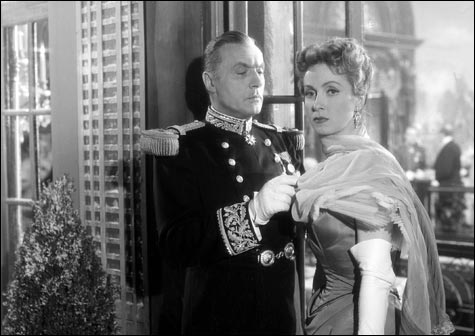
THE EARRINGS OF MADAME DE . . . Charles Boyer and Danielle Darrieux give two of the most astonishing performances in movie history. |
| “Plaisir D’Amour: the Films of Max Ophüls” | Harvard Film Archive: January 23–February 9 |
Max Ophüls embodies the soul of modern high comedy. In his swirling, candied, impossibly elegant films, where the camera dances through chic, layered studio sets, refusing to linger on some of the most exquisite décor ever seen on the screen, the characters are often heartsick aristocrats acting out ironic tales of lost love. In his best pictures, style and content are intertwined: the traveling camera and its counterparts in the setting (the spinning diorama the lovers visit in Letter from an Unknown Woman, the merry-go-round in La ronde), as well as his trademark image of waltzing couples, suggest both the social whirl and the fates of the men and women trapped within it."Plaisir d'Amour: The Films of Max Ophüls," the superb series that starts at the Harvard Film Archive this Friday, offers a detailed overview of the peripatetic career of one of the most famous yet least seen film masters. In a way, Ophüls's gliding-glancing style reflects his own life. The son of a conservative German-Jewish garment merchant (Ophüls changed his name when he went into show business to avoid embarrassing his parents), he was a celebrated stage director before he began to make movies in 1930. He released only a handful before the rise of the Nazis prompted him to emigrate. He directed films in Italy, the Netherlands, and France, where he was naturalized in 1938 — and from which he fled Hitler once again when the Germans marched into Paris in 1940. Ophüls's only '40s pictures were shot in Hollywood, under the oppressive supervision of Howard Hughes, who made his time there a misery — though three of the four films he did for Hughes were remarkable feats of craftsmanship. The first, THE EXILE (February 8), is a swashbuckler starring Douglas Fairbanks Jr. that he despised making. Ophüls returned to France in 1950, where he turned out his final quartet of films — one of which, THE EARRINGS OF MADAME DE . . . (January 23), is just about as great as any movie ever made.
Of his pre-Occupation features, the series includes LIEBELEI (January 25), his 1932 version of an Arthur Schnitzler play; the fascinating, oddball satirical picture COMEDY OF MONEY (January 26), which, shot in Amsterdam, has Brechtian and expressionistic touches; and three of his French films, TENDER ENEMY (January 24), THERE'S NO TOMORROW (January 25), and FROM MAYERLING TO SARAJEVO (February 9). The last two star the soulful Edwige Feuillère, of whose performances Americans rarely get a glimpse. I haven't seen Tender Enemy or There's No Tomorrow. From Mayerling to Sarajevo — whose title alludes to the popular romantic melodrama Mayerling made a few years earlier by Ophüls's mentor at Berlin's UFA Studio, Anatole Litvak (another German Jew who wound up in Hollywood) — focuses on the politically unwise courtship and marriage of Austrian archduke Franz Ferdinand (the handsome cipher John Lodge) and Czech countess Sophie Chotek (Feuillère). The romance ends abruptly with the assassination that touched off the First World War. This isn't one of Ophüls's better efforts; some of it is rather fatuous in the manner of a Hollywood historical spectacle from the same era. But it's sumptuous, and in addition to the magnificent Feuillère it has Gabrielle Dorziat as Franz's sympathetic mother, the Empress Maria Teresa.
 Related
Related:
Luckey in Amsterdam, Searching Trader's shelves, Review: Queen to Play, More 
- Luckey in Amsterdam
Simply, there’s no more prestigious place for a documentary to debut than IDFA, rightly regarded as the very best documentary festival in the world.
- Searching Trader's shelves
What should we make of the craze for cheap Trader Joe's wines that has overtaken Portland?
- Review: Queen to Play
A hotel maid, Hélène (Sandrine Bonnaire), in a French resort sees a glamorous foreigner (Jennifer Beals) playing chess one day, and she's determined to learn to play herself.
- Review: Incendies
Of the five pictures nominated by the Academy for Best Foreign Language Film this year, Denis Villeneuve's Incendies is the one that should have taken the Oscar.
- Review: The Princess of Montpensier
Like all religious wars, the conflict between Catholics and Huguenots in 16th-century France made a mockery of spiritual values.
- Review: The Kid with a Bike
This Grand Prix winner at Cannes 2011 is among the best films by Belgium's Jean-Pierre and Luc Dardenne.
- Less

 Topics
Topics:
Features
, Entertainment, Robert Ryan, Arthur Schnitzler, More  , Entertainment, Robert Ryan, Arthur Schnitzler, Simone Signoret, Simone Signoret, James Mason, Harvard Film Archives, French films, Arthur Laurents, Joan Bennett, Less
, Entertainment, Robert Ryan, Arthur Schnitzler, Simone Signoret, Simone Signoret, James Mason, Harvard Film Archives, French films, Arthur Laurents, Joan Bennett, Less 